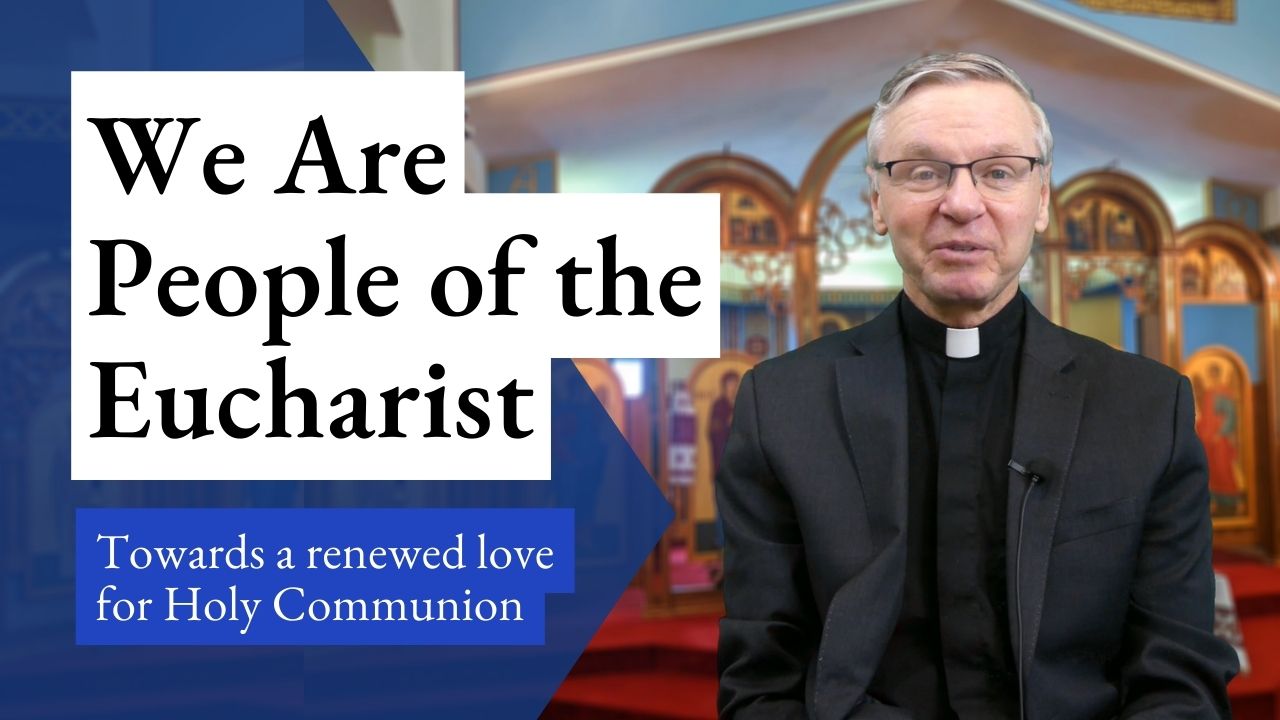We Are People of the Eucharist
Towards a renewed love for Holy Communion
Reflections on the Eucharist
by Bishop David Motiuk, Eparchy of Edmonton
April 2023
The Washing of the Disciples’ Feet
On Easter Sunday, we celebrate the Feast of the Resurrection of Our Lord and Saviour Jesus Christ, who died upon the cross for our sins, so that we might have eternal life.
Yet, we could not celebrate Easter without our Lord having first endured his passion. The Resurrection only finds meaning in Holy Thursday and the Institution of the Divine Eucharist and the Washing of the Disciples’ Feet; in Good Friday and the passion and crucifixion of Jesus; and in Holy Saturday and the Descent of Christ into Hades.
While Good Friday’s service of the Laying Out of the Plaschanytsia – that rectangular piece of cloth on which is painted the body of Christ laid out for burial – is much known and loved by the faithful, the events of Holy Thursday are less known and revered, yet they are of profound spiritual importance. Let us take a moment to reflect upon their meaning and significance in light of the Resurrection.
Earlier we spoke about the Institution of the Divine Eucharist, where Jesus offers us his body and blood as Divine Food for the journey home to the Garden of Eden, to Paradise, to the Heavenly Kingdom.
Yet it is not simply enough to receive Jesus’ body and blood. When Jesus instituted the Last Supper on Holy Thursday, he also assumed the role of a servant and washed the feet of his disciples. The Eucharist and the Washing of the Disciple’s feet are one and the same movement. We cannot separate one from the other. We eat so that we may serve.
The Gospel of John records the washing of the disciples’ feet in this fashion:
“And during supper Jesus… got up from the table, took off his outer robe, and tied a towel around himself. Then he poured water into a basin and began to wash the disciples’ feet and to wipe them with the towel that was tied around him.
“After he had washed their feet, had put on his robe, and had returned to the table, he said to them, ‘Do you know what I have done to you? You call me Teacher and Lord – and you are right, for that is what I am. So if I, your Lord and Teacher, have washed your feet, you also ought to wash one another’s feet.
“For I have set you an example, that you also should do as I have done to you” (John 13: 3-5; 12-16).
In many parts of the world, the custom of foot washing was a common practice of hospitality, especially where sandals were worn. A host would typically greet his guests, then provide water for them to wash their feet or have a servant do so. This practice was intended to honour the person by washing their feet as a sign of humility.
In Jesus’ time, we see this same hospitality being extended to him by Mary of Bethany who anoints his feet, perhaps in gratitude for having raised her brother Lazarus from the dead, but also in preparation for Jesus death and burial (see John 12: 1-8).
Elsewhere, Jesus chastises a Pharisee for his lack of hospitality when he fails to provide water for him to wash his feet. Jesus says to Simon:
“Do you see this [sinful] woman? I came into your house. You did not give me any water for my feet, but she wet my feet with her tears and wiped them with her hair… Therefore, I tell you, her sins, which were many, have been forgiven; hence she has shown great love” (Luke 7: 44, 47).
At the Last Supper, Jesus gives his disciples the model of humility. As we read in Matins from Great and Holy Thursday, “He who wraps the heavens with the clouds, now clothes himself with a linen cloth; he who holds the breath of every creature in his hands, now bends his knee to wash the feet of his servants.
“United by the bond of love, the apostles let their feet be washed by Christ, the Lord of the universe; and thus they became the brilliant messengers, proclaiming to the world the Gospel of peace” (Matins, Ode 5, Great and Holy Thursday).
Homework. I invite you to reflect upon the Last Supper and the Washing of the Disciple’s Feet and to see them as one unifying moment, not two distinct actions. We partake of Jesus’ body and blood so that, in humility, we might serve the needs of others. We eat so that we may serve.
After your reflection, share your thoughts with your family, friends, and fellow Knights.
We are people of the Eucharist.

